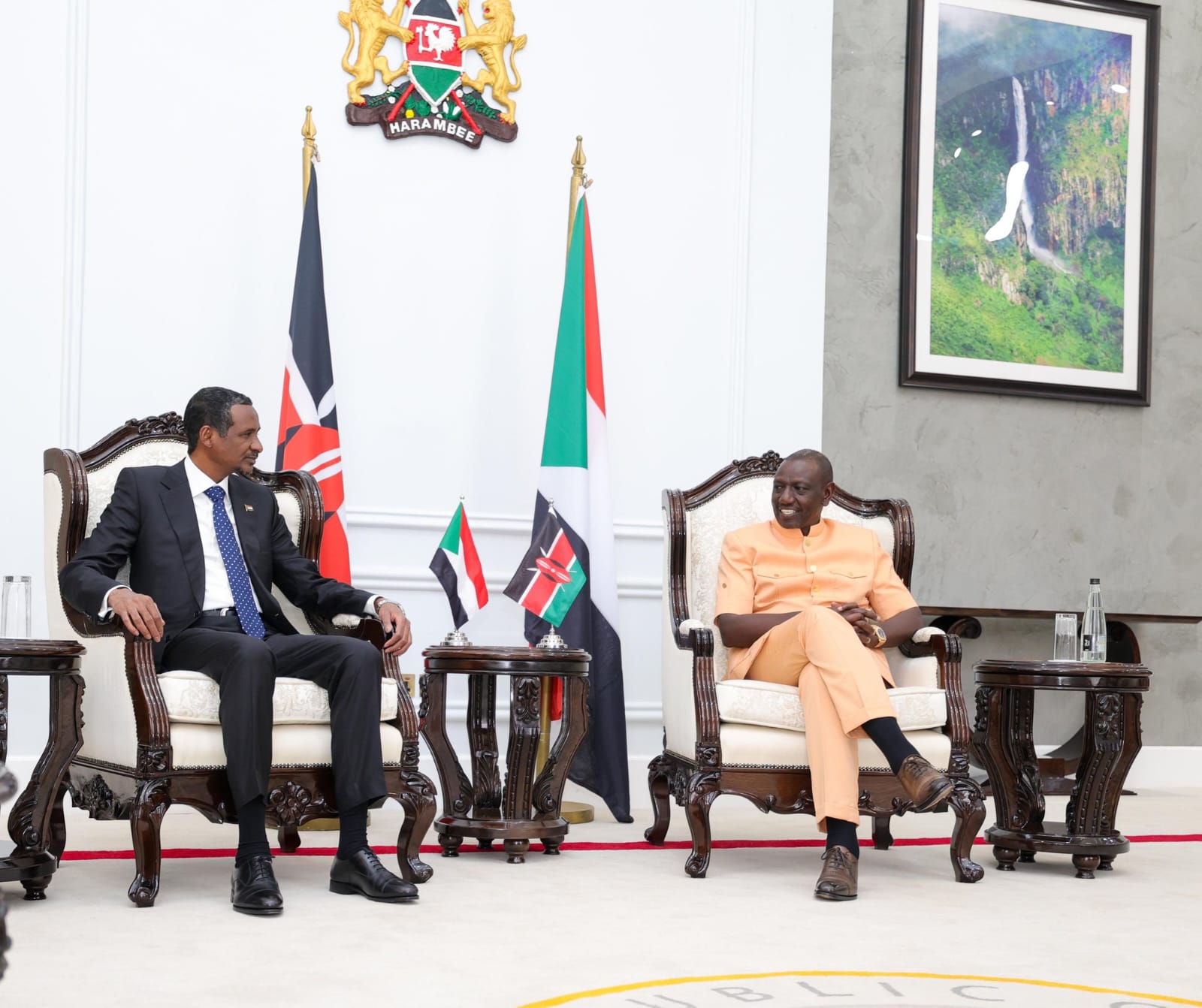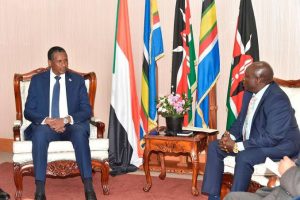Politics
Gachagua Accuses Ruto of Secret Gold Deals with Sudan Rebel Leader

In a bombshell interview on KTN News on Monday, former Deputy President Rigathi Gachagua alleged that President William Ruto is personally engaged in a gold trade deal with Sudan’s Rapid Support Forces (RSF) leader, Mohamed Hamdan Dagalo, widely known as Hemedti.
Gachagua, who served as Ruto’s deputy until their fallout in 2023, claimed that the President’s dealings with the internationally sanctioned rebel group are not only undermining Kenya’s diplomatic standing but also prioritizing personal gain over national interest.
Gachagua revealed that he was tasked with inviting Hemedti to Kenya in 2023, bypassing diplomatic protocols.
However, he was excluded from the closed-door meeting between Ruto and the RSF leader at State House in Nairobi. “Since it wasn’t possible for him to invite Hemedti due to diplomatic protocols, he asked me, as Deputy President, to extend the invitation,” Gachagua said.
“But I was locked out of the room. If it had been about Kenya’s interests, I would have been part of the meeting. Instead, I later learned it was a personal business discussion.”
According to Gachagua, the meeting focused on smuggling gold from Sudan to Jomo Kenyatta International Airport (JKIA) before transporting it to Dubai. “William Ruto is conducting business with the RSF leader. He invited Hemedti for business dealings at State House in Nairobi. They are smuggling gold from Sudan to JKIA and then shipping it to Dubai,” Gachagua alleged.
He accused Ruto of exploiting his position to facilitate this illicit trade, tarnishing Kenya’s reputation globally. “President Ruto must accept that he will not be president forever. He cannot destroy this country or how we are perceived by other nations,” Gachagua asserted. “He must be a nationalist, rise above commercial and personal interests, and put the country first.”
The ousted deputy president lambasted Ruto for what he called reckless leadership, arguing that the president’s ties to the RSF—an outfit sanctioned by the United States and accused of genocide in Sudan—are damaging Kenya’s international standing. “It’s putting Kenya in a very bad light,” Gachagua urged. “That group has been flagged by the international community, with sanctions imposed for genocide and the killing of children.” He pointed to U.S. sanctions imposed on Hemedti in January 2025, which freeze his assets and bar him from entering the country, as evidence of the RSF’s pariah status.
The RSF, a paramilitary group led by Hemedti, has been accused of widespread human rights violations, including genocide and the killing of children, amid Sudan’s ongoing civil war. Sanctioned by the international community, the group’s alleged association with Kenya poses a significant diplomatic liability. Gachagua warned that Ruto’s ties to the RSF have already prompted the Sudanese government to threaten a ban on Kenyan tea exports—a critical revenue source that earned Kenya $1.2 billion in the first 10 months of 2024, with Sudan ranking among its top 10 markets. “I’ve heard murmurs that Sudan is threatening to stop Kenyan tea exports over this,” Gachagua claimed, echoing concerns raised by tea traders in Mombasa following the RSF’s political event in Nairobi on February 18, 2025.
Broadening his critique, Gachagua alleged that Ruto’s foreign policy missteps extend beyond Sudan. He accused Ruto of mishandling the conflict in eastern Democratic Republic of Congo (DRC), claiming it has alienated fellow African leaders. “We’ve handled DRC very badly. I’m told many African presidents are unwilling to join peace initiatives led by President Ruto because he’s conflicted, prioritizing commercial and personal interests over national interest,” Gachagua said. This aligns with past tensions, such as the DRC recalling its ambassador from Nairobi in December 2023 after Kenya hosted the M23 rebel group—a move Kinshasa branded as betrayal.
Kenya’s decision to host the RSF in Nairobi on February 18, despite fierce backlash from Sudan, has intensified the controversy. The event, held at the Kenyatta International Convention Centre (KICC), saw RSF deputy commander Abdel Rahim Dagalo and other opposition figures sign a charter to establish a parallel government—an act Sudan condemned as “an act of hostility” and a violation of international norms. Sudan recalled its ambassador to Kenya in protest, accusing Nairobi of complicity in the RSF’s alleged atrocities. The Sudanese foreign ministry stated that hosting “a terrorist militia” responsible for genocide breached the UN Charter and the African Union Constitutive Act.
In response, Kenya’s government, through Prime Cabinet Secretary Musalia Mudavadi, defended its actions on February 19, framing them as part of its broader commitment to peace in Sudan. “Kenya remains at the forefront of seeking solutions to the humanitarian crisis in Sudan,” Mudavadi said, emphasizing the country’s role as a regional mediator under the Intergovernmental Authority on Development (IGAD). On February 24, Mudavadi reiterated Kenya’s stance, hailing the RSF’s charter-signing as a step toward reconciliation and calling for support from the African Union and United Nations. “The peace roadmap signed in Nairobi provides a solid framework for further negotiations,” he asserted.
However, the move has drawn sharp criticism from analysts and civil society groups. The Kenya Human Rights Commission (KHRC) labeled it a “grave violation” of Kenya’s obligations, warning that it undermines Sudan’s sovereignty and endangers Sudanese refugees in Kenya. U.S. Senator Jim Risch, chairman of the Senate Foreign Relations Committee, accused Kenya of “legitimizing” the RSF’s genocidal rule—a stance that could strain ties with Washington, which designated Kenya a major non-NATO ally in May 2024.
As the diplomatic fallout deepens, Gachagua’s allegations add fuel to an already heated debate over Ruto’s leadership. Whether these claims withstand scrutiny remains uncertain, but they highlight the high stakes of Kenya’s geopolitical gambles. For now, Nairobi walks a tightrope, balancing its peacemaking ambitions against the risks of isolation—and the potential cost to its economy and reputation.
Kenya Insights allows guest blogging, if you want to be published on Kenya’s most authoritative and accurate blog, have an expose, news TIPS, story angles, human interest stories, drop us an email on [email protected] or via Telegram
-

 Grapevine1 week ago
Grapevine1 week agoAlleged Male Lover Claims His Life Is in Danger, Leaks Screenshots and Private Videos Linking SportPesa CEO Ronald Karauri
-

 Lifestyle2 weeks ago
Lifestyle2 weeks agoThe General’s Fall: From Barracks To Bankruptcy As Illness Ravages Karangi’s Memory And Empire
-

 Grapevine6 days ago
Grapevine6 days agoRussian Man’s Secret Sex Recordings Ignite Fury as Questions Mount Over Consent and Easy Pick-Ups in Nairobi
-

 Investigations3 days ago
Investigations3 days agoMulti-Million Dollar Fraud: Three Kenyans Face US Extradition in Massive Cybercrime Conspiracy
-

 Investigations2 weeks ago
Investigations2 weeks agoEpstein’s Girlfriend Ghislaine Maxwell Frequently Visited Kenya As Files Reveal Local Secret Links With The Underage Sex Trafficking Ring
-

 News2 weeks ago
News2 weeks agoState Agency Exposes Five Top Names Linked To Poor Building Approvals In Nairobi, Recommends Dismissal After City Hall Probe
-

 Economy2 days ago
Economy2 days agoIran Demands Arrest, Prosecution Of Kenya’s Cup of Joe Director Director Over Sh2.6 Billion Tea Fraud
-

 Business1 week ago
Business1 week agoM-Gas Pursues Carbon Credit Billions as Koko Networks Wreckage Exposes Market’s Dark Underbelly

















